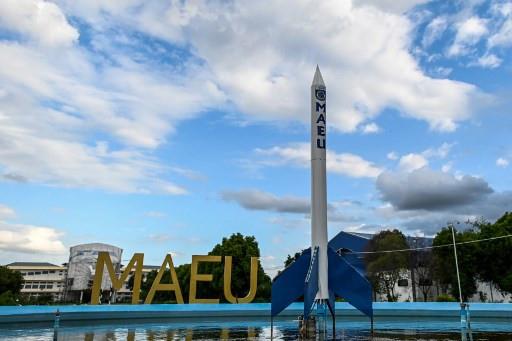NAYPYITAW, July 24 (AFP) - Myanmar is preparing to launch its first-ever satellite, joining an unlikely coalition of nascent space nations aiming to protect millions from environmental disasters.
The future "super constellation" of micro-satellites from nine Asian countries will track typhoons, seismic activity and water flows, as well as provide data on land use, the growth of crops and disease outbreaks.
It is the first space venture for Myanmar, the least economically developed country in a consortium that includes the Philippines, Vietnam and Indonesia.
The benefits of observing the environment from space match the millions of dollars Myanmar is spending, says Kyi Thwin, rector of the Myanmar Aerospace Engineering University.
"It's simply less expensive if we build our own satellite," he tells AFP from inside the university's space shuttle-shaped building near the town of Meiktila, adding the technology will help Myanmar's economy "leap-frog forward".
Yet Myanmar is still in a different orbit to the big space nations -- strong wind carried away the roof of the shuttle's nose and the university has no spare budget for repairs.
But with technological advances -- and a spirit of collaboration -- launching satellites is no longer the reserve of giants like the US, Russia and China.
Myanmar is preparing to launch its first-ever satellite, joining an unlikely coalition of nascent space nations aiming to protect millions from environmental disasters.
The future "super constellation" of micro-satellites from nine Asian countries will track typhoons, seismic activity and water flows, as well as provide data on land use, the growth of crops and disease outbreaks.
It is the first space venture for Myanmar, the least economically developed country in a consortium that includes the Philippines, Vietnam and Indonesia.
The benefits of observing the environment from space match the millions of dollars Myanmar is spending, says Kyi Thwin, rector of the Myanmar Aerospace Engineering University.
"It's simply less expensive if we build our own satellite," he tells AFP from inside the university's space shuttle-shaped building near the town of Meiktila, adding the technology will help Myanmar's economy "leap-frog forward".
Yet Myanmar is still in a different orbit to the big space nations -- strong wind carried away the roof of the shuttle's nose and the university has no spare budget for repairs.
But with technological advances -- and a spirit of collaboration -- launching satellites is no longer the reserve of giants like the US, Russia and China.
Yukihiro Takahashi from Hokkaido University, one of two Japanese institutes leading the project, points to Nigeria, which has become a global hub for producing satellite technology on the cheap.
"Big, heavy and expensive has become small, light and affordable," he says.
